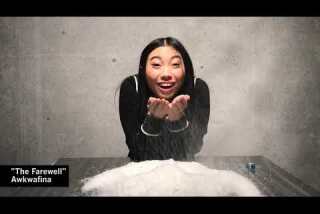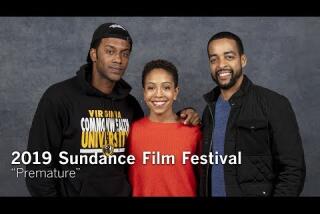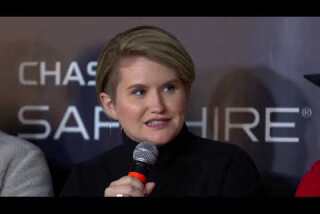Commentary: Michael Jackson documentary ‘Leaving Neverland’ gets Sundance off to a shattering start
- Share via
Reporting from Park City, Utah — Times film critic Justin Chang is keeping a regular diary over the course of a week at the 2019 Sundance Film Festival. He will be writing about the movies he’s seeing, the trends he’s observing and what it all means for an event that officially kicks off the year in new independent cinema.
The first full day of the Sundance Film Festival began with the world premiere of “Leaving Neverland,” Dan Reed’s shattering two-part documentary in which two men, Wade Robson and James Safechuck, describe the years of childhood sexual abuse they endured by one of the world’s most celebrated musicians. A high-profile late addition to the festival lineup, the project had been referred to in passing as “the Michael Jackson documentary” or “the Michael Jackson sex abuse documentary,” an example of the kind of blunt descriptive shorthand that often affixes itself to individual titles in a crowded program.
But after sitting through Reed’s nearly four-hour movie in its entirety, the idea of describing it in such terms feels faintly obscene. One of the most important insights of our ongoing #MeToo-era discourse is how quickly we can fixate on the accused and neglect their accusers; how, in our rush to excoriate abusers, we so readily forget the plight of survivors. That’s especially true when the abuser is a celebrity. A key point in “Leaving Neverland” is that people are readily blinded by the trappings of stardom and power, especially when those trappings are extended to us in the guise of friendship.
“Leaving Neverland” can hardly escape the long shadow cast by a pop-cultural icon like Jackson, or the fact that celebrity obsession will be a key driver of audience interest when it premieres on HBO this spring. But to its credit, it resists every temptation along the way to turn itself into Jackson’s story. Instead it is quite consciously Robson’s story, Safechuck’s story and, crucially, their families’ stories, braided together into a decades-spanning chronicle that confronts head-on both the agony of remembered abuse and the lingering, devastating ramifications of that abuse.
Robson, an Australian-born choreographer, was just a boy when he became obsessed with Jackson’s music and won a 1987 dance competition that earned him a first meeting with the pop star. Safechuck, a Simi Valley-born computer programmer, was around the same age when he was cast in one of Jackson’s Pepsi commercials. Although the two boys never crossed paths — as the two noted onstage during the post-screening Q&A, they were only recently able to connect, mainly due to legal reasons — their accounts are deftly intercut here by editor Jules Cornell, which allows a disturbingly persuasive pattern of behavior to emerge.
In each case, a young boy and his immediate family were drawn in by a star of indescribable magnetism. Expensive trips and lavish gifts followed, as well as extended visits to Neverland Ranch, Jackson’s theme-park-like estate in Santa Barbara County, where each boy was eventually left alone with Jackson, sometimes for days at a time.
Seemingly harmless play sessions (popcorn, candy, movies and video games) led to private acts of sexual abuse — oral sex, masturbation, attempted penetration — that continued for years at Neverland and beyond. Robson and Safechuck allege what was done to them in clinically precise and unsparing terms. But they also lay bare their intensely conflicted feelings toward a man they unhesitatingly loved, a man who was endlessly generous with his time, money and affection — at least until other boys took their place.
Michael Jackson’s sexual abuse accusers speak out at ‘Leaving Neverland’ premiere »
The sheer variety and volume of horrifying disclosures made here — Safechuck’s steady recall of every room at the ranch where Jackson abused him is truly the stuff of nightmares — make “Leaving Neverland” both riveting and grueling, impossible to turn away from and the definition of a tough sit. The details can seem repetitive at times, especially in the first act, as Reed lays the groundwork for even more explosive developments in the second. (The material could do with fewer heavily scored drone shots of Neverland, Los Angeles and other relevant locations, which, evocative as they are, feel like attempts to break up the flow of talking heads.)
But that repetition itself feels, in some ways, like a structural necessity. Reed doesn’t simply pinpoint criminal sex acts; he presents us with twin case studies in long-term psychological enslavement. All this went on for years, Robson and Safechuck remind us, and it would be many years more before they could even begin — as deeply wounded young men trying to raise families of their own — to pierce through their accumulated layers of guilt, shame, self-blame and self-denial. One of the movie’s most wrenching developments finds Robson mustering the courage to come forward with the truth, despite having testified adamantly on Jackson’s behalf when the pop star was charged in 2005 with molesting another boy.
Sundance 2019 Film Festival: See the latest video interviews


Video: Behind the scenes of the L.A. Times 2019 Sundance photo/video studio

Video: The 2019 Sundance Film Festival Boomerang Supercut

Video: How do you make the most of a small budget?

Video: Cast and filmmaker discuss trusting each other while shooting 'Premature'
3:12

Video: 'Brittany Runs a Marathon' breaks conventions and stereotypes

Video: Jillian Bell is tired of getting scripts about body image issues

Video: Jillian Bell lost 40 pounds for her role in 'Brittany Runs a Marathon'

Video: 'Brittany Runs a Marathon' actors break out of their sidekick roles
Both Robson and Safechuck say that Jackson nurtured his own relationship with their families, especially their mothers, even as he secretly fed the boys lies about their parents, trying to get them to rely on him and him alone. Both mothers are interviewed at length here (along with several other family members), and their sense of having failed to protect their children, of having permitted and even enabled these relationships, is presented in terms both damning and sympathetic. The family members are all interviewed in isolation, suggesting that even after the truth has come out, forgiveness and catharsis remain elusive.
Already pilloried by Jackson fans online and denounced by the late singer’s estate, “Leaving Neverland” was greeted at its lone Park City screening on Friday morning by a small group of protesters. (The movie will screen again Saturday in Salt Lake City.) During the post-screening Q&A, Robson, on stage with Safechuck, expressed that he understood why fans were unwilling to believe the worst about their idol, acknowledging that he was once a fan himself and well-acquainted with the power of denial.
“I was like them,” he said. “Even though it happened to me, I couldn’t believe it.”
More to Read
Only good movies
Get the Indie Focus newsletter, Mark Olsen's weekly guide to the world of cinema.
You may occasionally receive promotional content from the Los Angeles Times.











